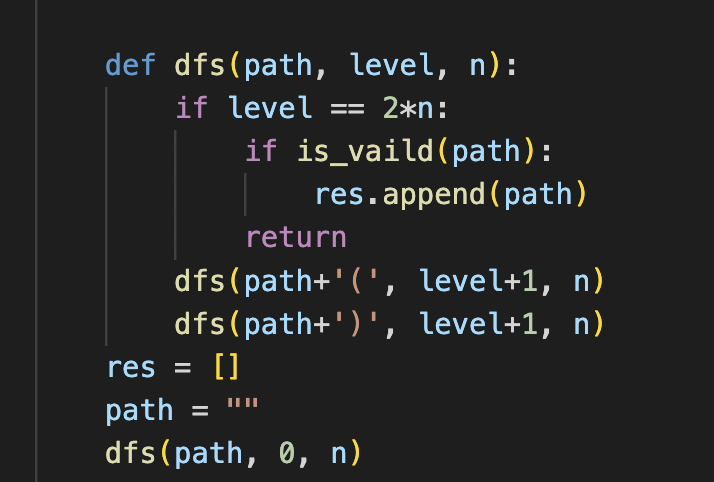22. Generate Parentheses(回溯)
Given n pairs of parentheses, write a function to generate all combinations of well-formed parentheses.
For example, given n = 3, a solution set is:
[ "((()))", "(()())", "(())()", "()(())", "()()()" ]
class Solution: def generateParenthesis(self, n: int) -> List[str]: res = [] def batracking(path,l,r): if len(path) == n*2 and l == n and r==n: res.append(path) if len(path) > n*2 or l >n or r > n or r > l: return batracking(path+'(',l+1,r) batracking(path+')',l,r+1) batracking("",0,0) return res

-
插入数量不超过n
-
可以插入 ) 的前提是 ( 的数量大于 )
class Solution: def generateParenthesis(self, n: int) -> List[str]: res = [] def backtrack(path,l,r): if l==r and len(path)==n*2: res.append(path) return if r > l or len(path)>2*n: return backtrack(path+'(',l+1,r) backtrack(path+')',l,r+1) backtrack("",0,0) return res
class Solution: def __init__(self): self.res = [] def generateParenthesis(self, n: int) -> List[str]: def vaild(path): l = 0 r = 0 for ch in path: if ch == '(': l+=1 else: r+=1 if r>l: return False return l == r def backtracking(path): if len(path) >2*n: return if vaild(path) and len(path) == 2*n: self.res.append(path) return backtracking(path+'(') backtracking(path+')') backtracking("") return self.res
暴力回溯:
class Solution { public: vector<string> res; bool is_vilid(const string& str) { int balance = 0; for (char c : str) { if (c == '(') { ++balance; } else { --balance; } if (balance < 0) { return false; } } return balance == 0; } void dfs(string& path,int level,int n) { if (level>n ) { return; } if (level==n ) { if (is_vilid(path)) res.emplace_back(path); return; } string path_back = path; path.append("("); dfs(path,level+1,n); path.pop_back(); path.append(")"); dfs(path,level+1,n); path.pop_back(); } vector<string> generateParenthesis(int n) { string path = ""; dfs(path,0,n*2); return res; } };

class Solution { public: vector<string> res; void dfs(string& path,int left, int right, int level,int n) { if (level>n || right > left || left>n/2||right>n/2) { return; } if (level==n &&left==right) { res.emplace_back(path); return; } string path_back = path; path.append("("); dfs(path,left+1,right,level+1,n); path.pop_back(); path.append(")"); dfs(path,left,right+1,level+1,n); path.pop_back(); } vector<string> generateParenthesis(int n) { string path = ""; dfs(path,0,0,0,n*2); return res; } };
思路:向string 中插入( 和 ),每插入一个就减1。 那么如何保证这个combination 是正确的呢?
-
插入数量不超过n
-
可以插入 ) 的前提是 ( 的数量大于 )
所以就得到了递归的两个条件。
1 class Solution(object): 2 def generateParenthesis(self, n): 3 """ 4 :type n: int 5 :rtype: List[str] 6 """ 7 res = [] 8 def help(s,left,right): 9 if(left==0 and right==0): 10 res.append(s[:]) 11 return 12 if left>0: 13 help(s+'(',left-1,right) 14 if right>left: 15 help(s+')',left,right-1) 16 help('',n,n) 17 return res





